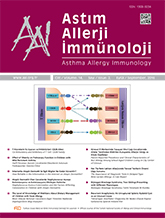


Objective: The aim of this study was to evaluate the knowledge of dietitians and dietetic students about food allergy in order to develop suggestions for educational activities.
Materials and Methods: Dietitians and dietetics students were surveyed via a questionnaire aimed to document their knowledge about food allergy management.
Results: Of the 150 questionnaires distributed, 122 valid questionnaires were returned. The response rate was 81.3%. Of all the respondents, 51.4% were working in a hospital. About sixty percent of respondents rated themselves `moderate` for identifying some clinical manifestations of FA, developing elimination diets, providing avoidance education, managing the dietary needs of children with cows` milk allergy (CMA). Only 72.1% of respondents answered the questions about foods that can cause anaphylaxis correctly. About forty percent of respondents did not recognize that food allergens could be transmitted by means of tools used for service such as knives and spoons and thought that smoke of the cooking food does not cause allergy. About sixty percent of respondents also thought that touching the food never causes allergic reactions. Of all the respondents, only about 18.9% suggested amino acid based formulas for children with CMA, 23% suggested fully hydrolized formulas and 39.3% thought that lactose free formulas can be given to patients with CMA.
Conclusion: This study revealed that there are some gaps in the knowledge of dietitians about food allergy. Dietitians should be given training on this subject and there should be a re-evaluation of health policies with a wider global perspective.